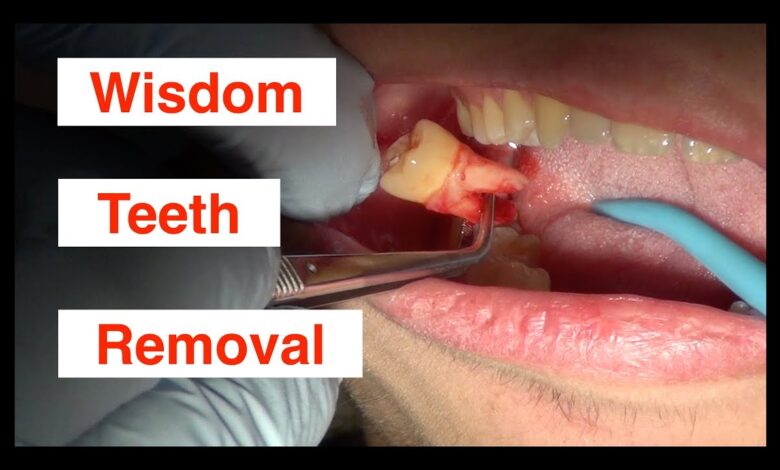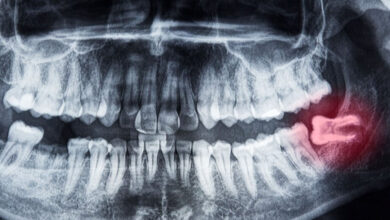What happens if you don’t get your wisdom teeth removed?

Table of Contents
What happens if you don’t get your wisdom teeth removed?
What happens if you don’t get your wisdom teeth removed? Have you thought about that before? Wisdom teeth, also known as third molars, typically emerge in the late teens or early twenties. While some people may have no issues with their wisdom teeth, many others experience complications that necessitate their removal. However, individuals often wonder what would happen if they choose not to undergo wisdom teeth extraction. In this blog post, we will explore the potential consequences of not getting your wisdom teeth removed and discuss the importance of professional dental advice.
1. Crowding and Misalignment:
One common problem associated with wisdom teeth is the potential for crowding and misalignment. When there is insufficient space in the mouth, the emerging wisdom teeth can push against existing teeth, causing them to shift out of alignment. This can lead to a variety of oral health issues, including crooked teeth, bite problems, and difficulties in maintaining proper dental hygiene. For more information on this topic, you can visit the American Association of Oral and Maxillofacial Surgeons’ webpage on wisdom teeth complications [1].
2. Impacted Wisdom Teeth:
Another issue that can arise when wisdom teeth do not have enough space to fully emerge is impaction. Impacted wisdom teeth remain trapped within the jawbone or gum tissue and can cause pain, swelling, and infection. If left untreated, impacted wisdom teeth can damage nearby teeth or even lead to the formation of cysts or tumors. The Mayo Clinic provides a comprehensive overview of impacted wisdom teeth and the associated risks [2].
3. Gum Infections and Periodontal Disease:
The presence of partially erupted or impacted wisdom teeth can create pockets in the gum tissue, providing a breeding ground for bacteria. This increases the risk of gum infections, such as pericoronitis, which causes inflammation and swelling around the affected tooth. Additionally, the accumulation of plaque and bacteria around wisdom teeth can contribute to the development of periodontal disease, a serious gum infection that can lead to tooth loss if left untreated. The American Dental Association offers valuable insights into gum infections and periodontal disease [3].
4. Cysts and Tumors:
In some cases, impacted wisdom teeth can lead to the formation of cysts or tumors in the jawbone. These abnormal growths can cause pain, damage neighboring teeth, and potentially lead to more serious complications if left untreated. Regular dental check-ups and X-rays are essential for detecting and monitoring any abnormalities associated with wisdom teeth. The Oral Cancer Foundation provides useful information on cysts and tumors related to wisdom teeth [4].
5. Difficulty in Oral Hygiene:
Wisdom teeth, especially when impacted or partially erupted, can be challenging to clean thoroughly. Their location at the back of the mouth makes it difficult to reach them with a toothbrush and floss, increasing the risk of plaque buildup, tooth decay, and gum disease. The British Dental Association offers practical tips on maintaining good oral hygiene, especially when dealing with wisdom teeth [5].
Wisdom Teeth Removal After 30: Is It Necessary?
If you are over 30 and still have your wisdom teeth, you may be wondering if their removal is necessary. In this blog post, we will explore the topic of wisdom teeth removal after the age of 30 and discuss the factors to consider when making this decision.
1. Is it necessary to remove it?
The necessity of wisdom teeth removal after the age of 30 depends on various factors, including the alignment of your teeth, the presence of symptoms or complications, and the recommendation of your dentist or oral surgeon. It’s important to consult with a dental professional who can assess your specific situation through a thorough examination and dental X-rays. They can determine if your wisdom teeth pose any risks or potential problems in the future.
2. There may be a risk of Complications
As you age, the risk of complications associated with wisdom teeth extraction may increase. The roots of the teeth become longer and more established, making the extraction process potentially more challenging. Additionally, healing may take longer, and there could be an increased risk of post-operative complications such as infection or dry socket. However, the overall risk is still relatively low, and most individuals recover well from wisdom teeth removal regardless of age.
3. Impact on Oral Health:
Wisdom teeth that are healthy, fully erupted, properly aligned, and not causing any issues may not necessarily require removal, even if you are over 30. However, it is important to monitor their condition through regular dental check-ups. If your wisdom teeth are causing crowding, misalignment, decay, gum disease, or other oral health problems, your dentist or oral surgeon may recommend removal to prevent further complications.
4. Pain or Discomfort:
Even if your wisdom teeth have not caused any problems so far, they can still become a source of pain or discomfort later in life. This could be due to infection, impaction, or pressure on adjacent teeth. If you experience persistent pain, swelling, or other symptoms in the area around your wisdom teeth, it is crucial to consult with a dental professional to determine the cause and discuss the appropriate course of action.
5. Individual Factors:
Each person’s situation is unique, and factors such as the shape and size of your jaw, the position of your wisdom teeth, and your overall oral health can influence the decision regarding wisdom teeth removal after 30. Your dentist or oral surgeon will consider these factors along with your medical history and any pre-existing conditions to provide personalized recommendations.
Wisdom teeth removal after the age of 30 is a decision that should be made in consultation with a dental professional. While not everyone will require removal, it is important to assess the alignment, condition, and potential risks associated with your wisdom teeth. Regular dental check-ups and X-rays can help monitor their progress and identify any issues that may arise.
Conclusion:
While some individuals may never experience issues with their wisdom teeth, it is crucial to consult with a dental professional to assess their condition and determine the need for extraction. Neglecting the removal of problematic wisdom teeth can lead to a range of complications, including crowding, misalignment, infections, cysts, and tumors. Regular dental check-ups and X-rays enable early detection and intervention, preventing potential oral health issues down the line.
Remember, this blog post serves as an informative guide, and it is always advisable to consult with a qualified dentist or oral surgeon for personalized advice and treatment options tailored to your specific situation.
Also, Read:
- Wisdom Teeth X-Ray: What you need to Know
- Sideways Wisdom Teeth: Causes, Pros, and Cons
- The Benefits of Keeping Wisdom Teeth: Debunking Common Myths
- Sore throat after wisdom teeth removal
- How to Reduce Swelling After Wisdom Teeth Removal
- What happens if you don’t get your wisdom teeth removed?
- Can wisdom teeth cause headaches? 3 ways!
- Everything you need to know about the Wisdom Teeth
References:
[1] American Association of Oral and Maxillofacial Surgeons: https://www.aaoms.org/patients-and-public/wisdom-teeth
[2] Mayo Clinic: https://www.mayoclinic.org/diseases-conditions/wisdom-teeth/expert-answers/wisdom-teeth-removal/faq-20058558
[3] American Dental Association: https://www.mouthhealthy.org/en/az-topics/g/gum-disease
[4] Oral Cancer Foundation: https://oralcancerfoundation.org/complications/wisdom-tooth-removal/
[5] British Dental Association: https://bda.org/advice/Your-Hormones/Pages/Wisdom-teeth.aspx



